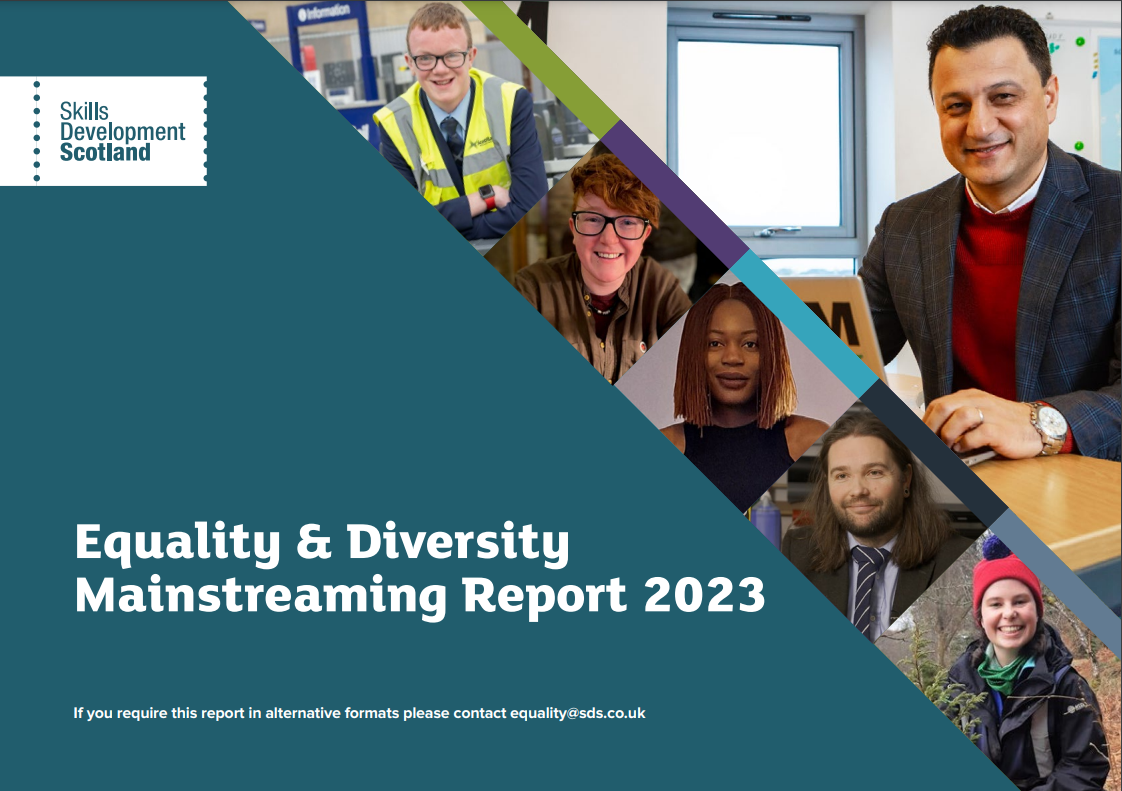Equality, Diversity & Inclusion – Mainstreaming Report Published
Our Equality and Diversity Mainstreaming Report 2023 is now available to download and read. This, our sixth report, highlights the actions we have taken since publication of our 2021-2025 Equality and Diversity Mainstreaming Report.
It sets out examples of the ways in which we have worked, and continue to act, to promote and increase equality of opportunity for people in Scotland who face disadvantage because of their protected characteristics or lived experience.
The report also looks forward and demonstrates how, through a wide range of policies, initiatives, and continuous improvement activities, we’re working to embed equality and diversity throughout our organisation and meet our responsibilities as a public sector body.

Working with partners
Produced in collaboration with partners and colleagues from across the national Skills Development Scotland (SDS) network, the report includes:
-
Our approach to mainstreaming
-
Our progress against our Equality Outcomes for 2021-2023
-
Our pay gap information for gender, disability and race
-
Occupational segregation for gender, disability and race
-
Our equality evidence review
-
SDS employee diversity information
Equality Evidence Review
Published alongside the report, the Equality Evidence Review, produced by the SDS Evaluation and Research team, (link), highlights that individuals across the protected groups and with can face some of the greatest barriers and poorest outcomes in relation to participation and progression in learning and work.
The review is broken down by separate sections focusing on each of the protected groups.
Top line findings
-
Those at the younger and older ends of the labour market are more likely to face barriers in work and potential discrimination. Young people are less likely to be in employment due to higher numbers in this age group being in education.
-
Girls and women have strong outcomes in the education system in terms of attainment and progression. However, in the labour market women are disproportionally affected by low pay, poor progression and underrepresentation at higher levels.
-
Care experienced young people face challenges in relation to educational attainment and labour market progression and their outcomes tend to be poorer than the rest of the population.
-
Disabled people are underrepresented in the labour market at all levels and are more likely to be in low paid, insecure employment. They are also more likely to have lower levels of educational attainment, although this varies according to disability.
-
Ethnic minority groups face challenges of underrepresentation, discrimination and low pay despite better educational performance at school and higher education.
-
LGB young people can often face significant bullying and harassment at school and these challenges can continue in the workplace.
-
Poverty interacts with other protected characteristics to produce some of the greatest inequalities. Poverty has a significant negative impact on labour market and educational outcomes.
-
Trans individuals face significant barriers in both education and labour market with bullying and harassment being key issues.
-
There is a strong business case for equality, diversity and inclusion in the workplace with clear benefits for employers and workers in relation to productivity, profitability, innovation and skills. In general, diverse businesses and organisations tend to be more successful.
-
Data availability is a key issue in relation to equality. In particular, there is little granular data on disability and race.
There is so much still to do. We do not underestimate the nature or size of the challenge ahead, but we remain ambitious for Scotland and all its people. We recommit to doing all we can, in partnership with Scottish Government and others, to help create a fairer, wealthier, and more inclusive society.

Damien Yeates
Chief Executive, SDS
The evidence clearly demonstrates more work is required to support people and businesses. Skills Development Scotland is working with partners across the skills and education landscape towards this goal. The report highlights a range of case studies and examples of our work, including:
- Logan Neilson, who is care experienced, really struggled at school. After leaving, he sought help from Stirling-based Careers Adviser Christine. He said " Christine made me believe in myself, and my confidence has never been stronger. All I can say is that she has changed my life and made me believe I can do anything. Skills Development Scotland is nothing short of amazing, and I owe them everything.”
- SDS administer and procure the Scottish Government funded Women Returners project which supports women across Scotland who have had a career break of six months or more or have multiple barriers to employment.
- One provider, Code Division, was created with the goal of reducing gender inequality in tech by helping women develop their digital skills. Recently, 29 female refugees from war-torn Ukraine were given dedicated help to enhance their digital and English skills to help them into work in Scotland.
- SDS initiated a project in partnership with Ambition Training Scotland and hairdresser Mavis Daniels to address the underrepresentation of Black and Minority Ethnic communities (BME) in hairdressing apprenticeships (1.32% of starts in 2019/20).
- In Summer 2021, as part of the SDS Corporate Parenting Plan and youth strategy, SDS delivered a summer internship programme pilot to care experienced individuals.
- In 2022, SDS extended the summer internship pilot and offered a 12-month placement to the interns following completion of their fourth year at university. Nicole Smith, Junior UX Designer, SDS, said “SDS's employment opportunities allowed me to comfortably transition from university to the world of work while also developing a variety of skills along the way.”
As an employer, the report highlights the significant investments we have made to SDS as an organisation via:
-
Fair Work Practices
-
Increasing and maintaining Board diversity
-
Policy and Service Development
While we recognise that there remains a number of underrepresented groups at SDS, there will continue to be a focus on improving diversity and inclusion across our workforce.